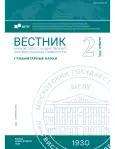Languages of Lyric Poetry of Medieval Romania: Cultural Codes and Pluralism of Artistic Styles
- Authors: Saprykina O.A.1, Shkolnikova O.Y.1
-
Affiliations:
- Lomonosov Moscow State University
- Issue: No 2(896) (2025)
- Pages: 59-66
- Section: Linguistics
- URL: https://journal-vniispk.ru/2542-2197/article/view/283969
- ID: 283969
Cite item
Full Text
Abstract
In the Romance languages – Provençal, French, Italian and Galician-Portuguese – masterpieces of medieval lyric poetry were created in the Middle Ages. Romance glottonyms contain information about the origin and beginnings of the historical development of Romance languages. The basic glottonym is “Roman”, demonstrating the unity of the Roman peoples, heirs of the Roman Empire. Poetic languages are carriers of specific cultural codes that were formed in the conditions of the medieval courtly universe, influenced the appearance of European culture and became entrenched in European languages. Each of the poetic languages formed on the basis of the early written Romance languages can be considered as art: they provide new systems of versification, the decoration of which is rhyme, a variety of syntactic means of expression, which leads to variations and shades of poetic meanings. The aim of this study is to determine the poetic code of those Romance languages that became the basis of medieval lyric art. The poetic code is transmitted from language to language through linguocultural transfer, which is based on the interaction of verbal and artistic traditions.
Keywords
About the authors
Olga Aleksandrovna Saprykina
Lomonosov Moscow State University
Author for correspondence.
Email: olgasaprykina@mail.ru
Doctor of Philology (Dr. habil.), Professor, Professor of the Department of Ibero-Roman Linguistics, Faculty of Philology
Russian FederationOlga Yuryevna Shkolnikova
Lomonosov Moscow State University
Email: shkolnikova@icloud.com
Doctor of Philology (Dr. habil.), Head of the Department of Romance Linguistics, Faculty of Philology
Russian FederationReferences
- Krasnyh, V. V. (2016). Slovar’ i grammatika lingvokul’tury. Osnovy psiholingvokul’turologii = Dictionary and grammar of linguoculture. Fundamentals of psycho linguistic and cultural studies. Moscow: Gnozis. (In Russ.)
- Alisova, T. B., Pluzhnikova, K. N. (2011). Staroprovansal’skij yazyk i poeziya trubadurov = The Old Versailles language and poetry of the troubadours. Moscow: Nauka. (In Russ.)
- Filshtinskij, I. M. (1975). Arabskaya poeziya srednih vekov = Arabic poetry of the Middle Ages. In Arabskaya poeziya srednih vekov (pp. 697–718). Introduction by K. Yashen. Compiler, afterword and commentary by I. Filshtinskij. Moscow: Hudozhestvennaja literatura. (In Russ.)
- Mejlah, M. B. (1975). Yazyk trubadurov = The language of the Troubadours. Moscow: Nauka. (In Russ.)
- Smirnov, A. A. (1965). Iz istorii zapadnoevropejskoj literatury = From the History of Western European Literature. Moscow: Hudozhestvennaya literatura. (In Russ.)
- Ribera y Tarragó, J. (1928). Disertaciones y Opúsculos. Madrid.
- Menendes Pidal, R. (1961). Izbrannye proizvedeniya. Ispanskaya literatura srednih vekov i epohi Vozrozhdeniya = Selected works. Spanish literature of the Middle Ages and Renaissance. Moscow: Izdatel’stvo inostrannoj literatury. (In Russ.)
- Shishmarev, V. F. (1965). Izbrannye stat’i. Francuzskaya literatura. Moscow: Nauka. (In Russ.)
Supplementary files










